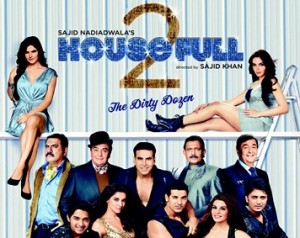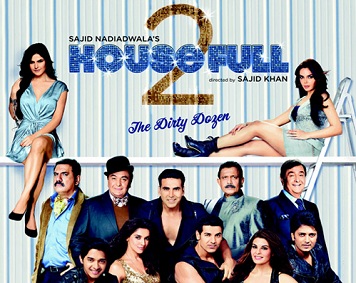by Yayaati Joshi
[box] Yayaati Joshi is befuddled as to why Housefull2 runs to packed houses when critics have written it off. And he has an inkling of an answer, which questions the very basic measure of a movie’s success: the box office. Read on to find out. [/box]I chatted with a friend of mine a couple of weeks ago. ‘Out with family to see Housefull 2.Tickets not available’. There was a colon and a parenthesis indicative of a sad mood after the short message. I wondered why the movie would run to packed houses when it had been panned by critics all over. In the middle of the film, she texted again, ‘It’s foolish. But it’s fun’. Not to be bothered either with the scurrilous criticism of the reviewers, or with the populist acceptance of the friend, I went to see the movie myself. It was being shown at two cinema halls, and I had to go the second one, because the first was sold out.
Fifteen minutes into the film, and seeing Rishi Kapoor, a revered actor of yesteryears, who’s had his share of bad films, perform actions which were to be construed as comedy, I had passed my judgment on the film. It was to be inveighed; moviegoers deserve better. Where are the indie films when you need them (yes, I mean Oye Lucky LuckyOye)? I’d love to discuss the simple mindedly populist ‘plot’ of the film, but it’s not worth the reader’s time. And yet, one wonders why a film, as poorly made as this, would be a commercial success, while Paan Singh Tomar had to wait two years to get released because it couldn’t find any distributors?
The answer to this question doesn’t come easy. Calling the film low-brow, and explaining that it appeals to the front benchers only, runs the risk of being dubbed as a culture snob. Like it, like some did, and you become an inseparable part of the masses that will cringe if told to watch a Terrence Malik movie. Doing neither, and being indifferent makes you the navel-gazing blogger who would stop at nothing to snub a film by simply ignoring it. Torn between the complex trinity of the above choices, I chose to do the first. At no point in the film did I feel that it was meant to be for those who turn to cinema for just entertainment – despite its mediocre script, the visual ‘grandeur’ of the film made it seem like the movie was meant for every kind of filmgoer. A no brainer it sure was; a deftly prepared comedy of errors it wasn’t. A dozen actors, of whom two are supposed to steal the show, one by flexing his arm often, the other by guffawing at his own jokes to make you realise that it was a joke indeed, cannot pull off the lack of class in the film.
 Star power? Check. Actors from the past? Check. Skin show? Check. ‘Laughter’? Check. Entertainment? Check. Then what just is wrong with the film, one wonders. Commercial success, the most important yardstick by which a filmmaker can judge his product, has come easy to the film. It still (three weeks after the release) is getting enough eyeballs to keep the producers smiling. Akshay Kumar, who’d delivered a hit back in Jurassic age, can finally claim to have been a part of a hit film. Everyone’s smiling (and some laughing rather loudly) and yet there’s something that is instantly lacking in quality. Take for example, the scene in which Asin (beautiful and talented, I was shocked to see her as a part of this film) talks on the phone and Akshay Kumar (with the same look on his face that he’s had since Hera Pheri) misunderstands and starts stripping: it is one of the most irritating (to say the least) scenes in the film. And Voila! That I guess is the problem. The director expects us to laugh at scenes which he thinks are funny, not those which could have been actually funny, in a new way, giving us some fresh material to giggle at.
Star power? Check. Actors from the past? Check. Skin show? Check. ‘Laughter’? Check. Entertainment? Check. Then what just is wrong with the film, one wonders. Commercial success, the most important yardstick by which a filmmaker can judge his product, has come easy to the film. It still (three weeks after the release) is getting enough eyeballs to keep the producers smiling. Akshay Kumar, who’d delivered a hit back in Jurassic age, can finally claim to have been a part of a hit film. Everyone’s smiling (and some laughing rather loudly) and yet there’s something that is instantly lacking in quality. Take for example, the scene in which Asin (beautiful and talented, I was shocked to see her as a part of this film) talks on the phone and Akshay Kumar (with the same look on his face that he’s had since Hera Pheri) misunderstands and starts stripping: it is one of the most irritating (to say the least) scenes in the film. And Voila! That I guess is the problem. The director expects us to laugh at scenes which he thinks are funny, not those which could have been actually funny, in a new way, giving us some fresh material to giggle at.
In a reductive way, the problem boils down to this: there isn’t enough new stuff to use, and to fill that void, the filmmakers have to resort to older techniques – an alleged comedy of errors (Housefull2), honest cop versus a corrupt system (Singham), unbelievable action scenes by muscle flaunting stars (Dabbang), and many other scripts that we have seen in one form or the other. It is in such situation that a film like Paan Singh Tomar stands out. It uses none of the worn out techniques, and gives the audience a fresh plot to look at.
It would be too simplistic to claim that the success of this film reflects poorly upon the tastes of the movie goers. The critics – the alleged smug-snobs who devilishly criticise every film that they can – have been left stunned, but then, the critic can only voice his opinion. In the end, if a movie has done well, there is not much to be said about the method by which it achieved success. Sadly, the use of only that benchmark to judge films is flawed.
Film Freak is an exclusive monthly column by Yayaati Joshi, who, well, is a film freak. It features movie reviews and essays on various aspects of Indian and world cinema.
Yayaati Joshi is a man with simple tastes and intense beliefs. Contrary to the bling associated with the capital city, he prefers the company of close friends, an engaging book or an Alfred Hitchcock movie. His placid demeanour is often mistaken for reticence; Yayaati is a self- proclaimed loner, whose recent pursuits include his foray as a budding writer. Yayaati blogs at http://rantingsofadelusionalmind.wordpress.com
[box type=”download”] If you have trouble opening the PDF, please right click on the button and select ‘Save Link As/Save Target As’. This will help save the PDF to your computer. If you still have trouble, drop us a mail at editors@sparkthemagazine.com and we will mail you the PDF straight to your inbox! DON’T MISS THE PDF EXPERIENCE![/box] [button link=”http://www.sparkthemagazine.com/wp-content/uploads/2012/05/spark-may-2012.pdf” newwindow=”yes”] Click here to download the May 2012 issue as a PDF![/button] [button link=”http://issuu.com/sparkeditor/docs/spark-may-2012?mode=embed&layout=http%3A%2F%2Fskin.issuu.com%2Fv%2Fcolor%2Flayout.xml&backgroundColor=000000&showFlipBtn=true” color=”green” newwindow=”yes”] Click here to flip and read the May issue like a magazine![/button]
[facebook]Share[/facebook] [retweet]Tweet[/retweet]








[…] edited version of the article can be read here] Share this:FacebookTwitterLinkedInEmailRedditLike this:LikeBe the first to like this post. Posted […]